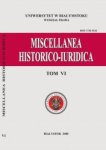Wpływ filozofii kantowskiej na poglądy filozoficznoprawne Eugeniusza Jarry
The Influence of Immanuel Kant’s Philosophy on Philosophy of Law by Eugeniusz Jarra
Author(s): Karol KuźmiczSubject(s): History of Law, Recent History (1900 till today), 19th Century, Philosophy of Law
Published by: Wydawnictwo Uniwersytetu w Białymstoku
Keywords: Kant’s philosophy of law; natural law;
Summary/Abstract: Eugeniusz Jarra (1881–1973) was a historian of philosophy of law, working on Warsaw University till 1939, then he emigrated to France and subsequently to England. Although he wasn’t a member of Kant’s school of philosophy, but you can find distinct connections with Kant’s philosophy. Jarra was closer to Christian philosophy and to social doctrine of the Catholic Church. He believed that the natural law is a psychical experience and this places him among the representatives of so called gnoseological theories of natural law with changing content. For him the natural law was the internal „voice of equity” and also the ideal pattern of positive law. Eugeniusz Jarra treated natural law as a demand addressed to legislative power and as an element of state’s policy of law. Jarra also saw connections between Kant’s conception of state as „unification of human beings under the power of acts” with his idea of citizens’ unity. The concept of state presented by Jarra, in which citizens’ duties play dominant role, can be close to authoritarian or even totalitarian concept of state. This shows that Jarra was only superficial in sharing Kant’s views.
Journal: Miscellanea Historico-Iuridica
- Issue Year: 6/2008
- Issue No: 1
- Page Range: 79-95
- Page Count: 17
- Language: Polish

